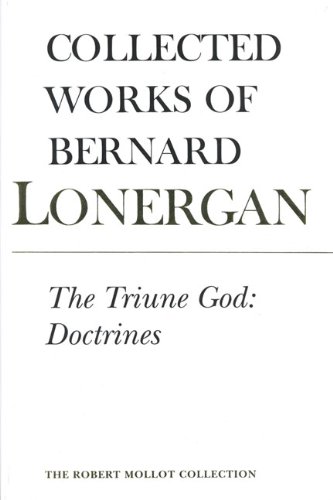

Most ebook files are in PDF format, so you can easily read them using various software such as Foxit Reader or directly on the Google Chrome browser.
Some ebook files are released by publishers in other formats such as .awz, .mobi, .epub, .fb2, etc. You may need to install specific software to read these formats on mobile/PC, such as Calibre.
Please read the tutorial at this link: https://ebookbell.com/faq
We offer FREE conversion to the popular formats you request; however, this may take some time. Therefore, right after payment, please email us, and we will try to provide the service as quickly as possible.
For some exceptional file formats or broken links (if any), please refrain from opening any disputes. Instead, email us first, and we will try to assist within a maximum of 6 hours.
EbookBell Team

4.3
28 reviews
ISBN 13: 9780802096678
Author: Bernard Lonergan
Written in Latin for students at the Gregorian University in Rome, Bernard Lonergan's De Deo Trino (The Triune God) is a monumental two-part examination of trinitarian theology published initially in 1961 and again, in revised form, in 1964. The first part, the pars dogmatica, is here translated into English in an edition that includes the original Latin on facing pages. The work begins with the Prolegomena, which traces the dialectical development of trinitarian doctrine by Christian thinkers from the time of the New Testament to the Council of Nicea (AD 325). Following is a discussion of five theses outlining the evolution of the principal features of trinitarian doctrine from the New Testament through the patristic era.
Part 1: Prolegomena
1 Dogmatic Development
2 The Judeo-Christians
3 The Gnostics and Other Sects
4 Adoptionists, Patripassians, Sabellians
5 Subordinationism
6 ‘Of One Substance'
7 ‘The Image of Goodness Itself’
8 Arians and Semi-Arians
9 Homoousion, Consubstantial
10 The Structure of the Ante-Nicene Movement
Part 2: Five Theses
Thesis 1: God the Father neither made his own and only Son out of preexisting matter nor created him
Terminology
Theological note
Adversaries
Argument from scripture
The patristic argument, part 1
The patristic argument, part 2: Christians everywhere neither tolerated the many gods the pagans bel
The patristic argument, part 3: Such is the consensus among the ante-Nicene Fathers in acknowledging
Thesis 2: The Holy Spirit, Lord and Life-giver, who proceeds from the Father and who spoke through t
Terminology
Documents
Adversaries
Argument from sacred scripture, part 1: Although the word ‘spirit’ is used in many ways, Christi
Argument from sacred scripture, part 2: The Spirit understood in this sense (1) spoke through the pr
Argument from sacred scripture, part 3: From this we conclude that this same Spirit is one reality,
Argument from sacred scripture, part 4: The Holy Spirit is a divine reality, yet is distinct from th
Argument from sacred scripture, part 5: Therefore the Holy Spirit is to be adored and glorified toge
Summary of the foregoing
Excursus: The use of symbols in St Paul
Teaching of the Fathers
Thesis 3: Thus, the Father and the Son and the Holy Spirit have one divinity, one power, one substan
Terminology
Meaning of the assertion
Importance of the assertion
Documents
Adversaries
First part of the argument: The Father and the Son and the Holy Spirit have one divinity, one power,
Second part of the argument: They are three persons or hypostases distinguished from one another by
Third part of the argument: Hence in God all things are one where there is no relational opposition
Corollaries
the triune god explained
the triune godhead
the triune god in the bible
a triune god
what is the triune god of christianity
bible triune god
the triune god
Tags: Bernard Lonergan, Triune, Doctrines